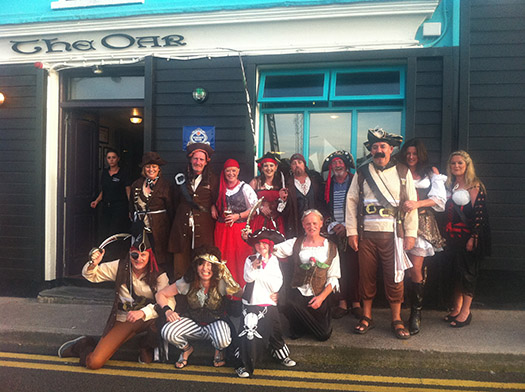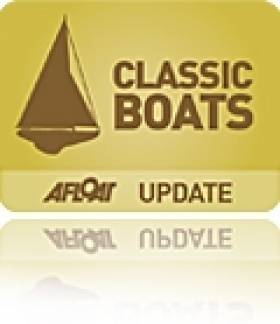Displaying items by tag: wooden
#classicboats – The Crosshaven Traditional Sail event on the Irish south coast celebrates twenty years of age this season in Cork harbour when dozens of classic sailboats, traditional currachs and a vintage steam boat will line up at the Hugh Coveney pier in Crosshaven.
The Traditional Sail event takes place on the weekend of Friday 19th to Sunday 21st of June.
The classic regatta is a family favourite for landlubbers and seadogs alike with in-harbour racing, followed by barbeques and music in pubs throughout Crosshaven village all weekend. In keeping with seafaring tradition, there is a pirate theme to the regatta, with prizes for the best dressed pirates, salty seadogs, wenches and young admirals of the fleet.
The line-up also includes kids knot-tying and crab fishing competitions and informative lectures and talks on restoration projects past and present are held for the timber junkies among us! Traditional wooden boats which include Pat's Tanners own Galway Hooker, "An Faoilean" constructed over a century ago in Co. Galway and Ray Heffernans St Bridget built by Tyrells of Arklow are among the craft which will take part.
The fleet will assemble at the Hugh Coveney Pier from Friday evening, June 19th and visitors can see the boats up close by calling by on Friday evening or Saturday morning. Shore side spectators can watch the in-harbour racing from vantage points at Camden Fort Meagher or enjoy the parade of sail from Crosshaven village as the fleet will sail along the Owenabue River on Sunday afternoon.
The event was the brain child of local sailor and Boatyard owner Wietze Bowalda and some local publicans and has enjoyed fleet sizes of in excess of 40 boats. Over the last 20 years the event has been chaired by Mark Bushe and Pat Tanner who are also on the committee for the 20th anniversary celebrations.

Pirates at the Oar Pub
This year we have engaged the Drascomb Lugger class, the Heir island sloops and we are arranging a cruise in company from baltimore to encourage West Cork based boats to make the journey east. For the shore based, there will be Tall ships on the Hugh Coveney Pier and we are planning a fireworks display on the Saturday night to add to party atmosphere which takes over the village for this weekend each year.
"Crosshaven is a great host village for this classic event" explains event organiser James Fegan "There is excellent sailing waters in Cork harbour and as a spectator if you were to never leave the dock you can still get an appreciation of these classic boats. We have a loyal following of boat owners who come annually to the event from all along the coast.
"There's always a great atmosphere in Crosshaven on this weekend" explained Denis Cronin of Cronin's Pub "Everyone from the kids to the local business owners really embrace the spirit the event. Here in the pub we even exchange our regular glasses for jam jars... because pirates always drinks from jaaaaarrs!"






























































